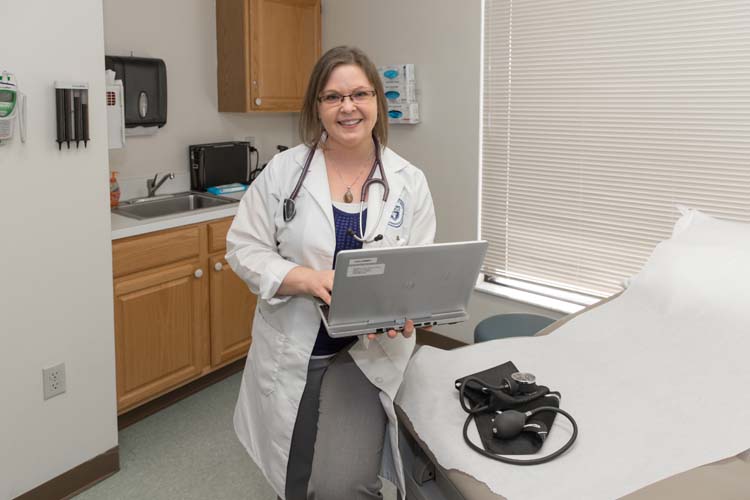A study out of Tulane University in New Orleans concludes that women 60 and older who take antibiotics – even for a short time – may be at a higher risk of death.
In recent years, it’s become common knowledge the widespread use of antibiotics has allowed infectious organisms to adapt and become resistant to the drugs’ intended effects – which is to cure infections by killing or injuring bacteria.
Another unintended consequence of antibiotic use is how even a single course of the drug can disrupt the gut microbiome – the complex community of beneficial microorganisms that reside in our digestive tract. This can lead to a decline in “good” bacteria – including the species that produce “butyrate,” a substance that inhibits inflammation and cancer formation in the gut.
Cassi Jones, DO, an internal medicine physician associated with the Sebastian River Medical Center, says that there is much ongoing research about the importance of the gut microbiome (sometimes more picturesquely called gut flora) in our overall health. She cites a study that found children who are frequently treated with antibiotics for ear infections and other childhood ailments are at an increased risk for obesity.
The results of the Tulane study, which was conducted in collaboration with Harvard T.H. Chan School of Public Health, provides yet another reason for doctors to avoid prescribing antibiotics unless they are absolutely needed.
The researchers set out to investigate how antibiotic use during late adulthood might be related to the risk of death. To do so, they studied data collected on 37,510 women, aged 60 and older, who did not have heart disease or cancer at the start of the study.
Study co-author Lu Qi, a professor of epidemiology at Tulane, says, “antibiotic exposure affects balance and composition of the gut microbiome, even after one stops taking antibiotics; so, it is important to better understand how taking antibiotics might impact risks for chronic diseases and death.”
The findings of Professor Qi and his team were alarming: taking antibiotics for at least 2 months in late adulthood was linked with a 27 percent increase in risk of death. The link was even stronger for study participants who reported they had also taken antibiotics during middle adulthood (between the ages of 40 and 59).
Women who took antibiotics for two months or more in late adulthood were also at a 58 percent higher risk of death due to heart problems, compared with women who did not use antibiotics. However, the researchers did not find an association between antibiotic use and the risk of death from cancer.
They did find that the associations between antibiotic use and an increased risk of death remained strong when other factors – such as lifestyle, diet, weight and the use of other medications – were taken into account.
Sebastian’s Dr. Jones says that the Tulane study has value, though some of its findings are inconclusive. “Hopefully, this study will lead to other research which takes a closer look at factors such as why the person was on antibiotics to begin with. There’s a big difference in expected health outcomes if the person was given antibiotics for a minor sinus infection versus as part of a treatment plan for a more serious illness.”
The findings of Professor Qi and his team were presented in a scientific session at a meeting of the American Heart Association, held in New Orleans in March of this year.
To be fair to antibiotics, they are an essential part of modern medicine, and are the only cure for a large number of infectious diseases. When first used as a medicine in 1942, penicillin became the most effective life-saving drug in the world, conquering such diseases as tuberculosis, gangrene, pneumonia, diphtheria and scarlet fever. Since the early 1940s, scientists have developed more than 150 different antibiotics to help stop the spread of infections, and antibiotics are estimated to have saved at least 200 million lives worldwide.
However, at the same time, there is little doubt that antibiotics are overprescribed. In spite of the nearly universal belief in the medical community that colds are caused by viruses and are not helped by antibiotics, the Centers for Disease Control and Prevention (CDC) reports that each year in the United States 18 million courses of antibiotics are prescribed by doctors for the common cold.
Additionally, 50 million antibiotic prescriptions are written for viral respiratory infections, a condition for which they are ineffective. These incorrectly prescribed antibiotics significantly contribute to the increasing resistance of bacteria to many antibiotics and the rise of “superbugs.”
Dr. Jones says that doctors should do a better job of educating their patients about the possible ill-effects of taking antibiotics unnecessarily.
“It’s just not that they are ineffective against viral infections; they can be harmful. And there are alternatives that doctors should discuss with their patients. For example, boosting the immune system and reducing the risk of viral infections by taking supplements such as vitamin C or echinacea. Or treating ear infections with antibiotic drops, rather than drugs that can affect the whole body.”
Cassi Jones’ practice, Sebastian River Medical Group, is located at 13480 U.S. 1 in Sebastian. The office phone is 772-581-0334.

